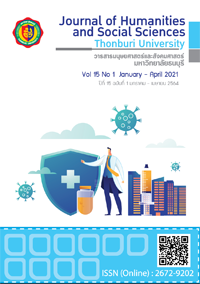The แบบของความเป็นผู้นำที่มีอิทธิพลต่อความพึงพอใจในงาน ความผูกพันธ์ต่อองค์การ และผลการปฏิบัติงาน ของพนักงานต้อนรับธุรกิจโรงแรมในภาคเหนือ ประเทศไทย
คำสำคัญ:
รูปแบบผู้นำการเปลี่ยนแปลง, รูปแบบผู้นำการแลกเปลี่ยน, ความพึงพอใจในงาน, ความผูกพันต่อองค์การบทคัดย่อ
การวิจัยนี้มีวัตถุประสงค์เพื่อ วิเคราะห์อิทธิพลของรูปแบบของความเป็นผู้นำ ได้แก่ รูปแบบผู้นำการเปลี่ยนแปลง และรูปแบบผู้นำการแลกเปลี่ยนที่มีผลต่อความผูกพันต่อองค์การ ความพึงพอใจในงาน และผลการปฏิบัติงานของพนักงานแผนกต้อนรับธุรกิจโรงแรมในภาคเหนือ ประเทศไทย ซึ่งการวิจัยนี้มุ่งให้ความสนใจโรงแรมในพื้นที่ที่เป็นเมืองท่องเที่ยวหลักในภาคเหนือของประเทศไทย กลุ่มตัวอย่างที่ใช้ในการศึกษาคือ พนักงานต้อนรับของโรงแรมในภาคเหนือของประเทศไทย โดยการสุ่มตัวอย่างง่ายจำนวน 400 ตัวอย่าง เครื่องมือที่ใช้ในการวิจัยคือ แบบสอบถาม และวิเคราะห์ข้อมูลพื้นฐานโดยใช้ สถิตเชิงพรรณนา และแบบจำลองสมการโครงสร้าง (SEM) โดยวิเคราะห์ด้วยลิสเรล ผลการวิจัยพบว่า รูปแบบผู้นำการเปลี่ยนแปลงมีอิทธิพลทางตรงเชิงบวกต่อความผูกพันต่อองค์การ และรูปแบบผู้นำการแลกเปลี่ยนมีอิทธิพลทางตรงเชิงบวกต่อความผูกพันต่อองค์การและความพึงพอใจในงาน ที่ระดับนัยสำคัญ 0.01 อย่างไรก็ตาม การใช้รูปแบบของผู้นำทั้งผู้นำการเปลี่ยนแปลงและผู้นำการแลกเปลี่ยน ล้วนก่อให้เกิดความผูกพันธ์ต่อองค์การ ผลการปฏิบัติงานที่ดีในด้านการปฏิบัติงานได้ตรงตามมาตรฐานและแผนงานที่วางไว้ของพนักงานต้อนรับในธุรกิจโรงแรม
เอกสารอ้างอิง
Ahmad, Habib, Ahmad, Khursheed and Shah, Idrees Ali. (2010). Relationship between Job Satisfaction, Job Performance Attitude towards Work and Organizational Commitment. European Journal of Social Sciences. 18(2): 257-267.
Alghazo, Ali M. and Al-Anazi, Meshal. (2016). The Impact of Leadership Style on Employee's Motivation. Journal of Economics and Business Administration. 2(5): 37-44.
Bahmanabadi, S. (2015). A Case Study of the Impact of Leadership Styles on Bank Employees’ Job Satisfaction. (Independent thesis Basic level, Södertörn University, School of Social Sciences).
Bass Bernard M. & Avolio, Bruce J. (1994). Improving organizational effectiveness through transformational leadership. Newbury Park, CA: Sage Publication.
Bass Bernard M. (1985). Leadership and performance beyond expectation. New York: The Free Press.
Boonsiri, Karn and Porncharoenwiroj, Potchanart. (2014). Leadership and professional education administrator. Journal of Graduate Studies Valaya Alongkron Rajabhat University. 8(1): 1-16.
Burns James M. (1978). Leadership. New York: Harper & Row.
Chanthana, Sansook. (2014). Antecedents and Consequence of Strategic of Leadership Capabilities of Higher Education Institute in Thailand. Journal of Association of Researchers. 19(1): 34-46.
Chowdhury, R.G. (2014). A Study on The Impact of Leadership Styles on Employee Motivation and Commitment: An Empirical Study of Selected Organizations in Corporate Sector. (Dissertation Submitted to the Padmashree Dr D. Y. Patil University, Navi Mumbai, Department of Business Management).
Cochran William G. (1977). Sampling Techniques. 3rded. New York: John Wiley & Sons.
Lee, Jean. (2005). Effects of leadership and leader-member exchange on commitment. Leadership & Organization Development Journal. 26(8): 655-672.
Yousef, Darwish Abdulrahman. (2000). Organizational Commitment: A Mediator of the Relationships of Leadership Behavior with Job Satisfaction and Performance in a Non-Western Country. Journal of Managerial Psychology. 15(1): 6-24.
Rahothan, Jiraporn. (2016). Job Satisfaction, Organizational Commitment, Quality of Work Life and Happiness Affecting Staffs’ Work Performance of Healthy Organization in Eastern Region of Thailand. Sripatum Chonburi Journal. 13(2): 24-34.
Saleem, Hina. (2015). The impact of leadership styles on job satisfaction and mediating role of perceived organizational politics. ScienceDirect, Social and Behavioral Sciences. 172(2015): 563–569.
Shoosanuk, Ampon, Shoosanuk, Chaveewan and Phengpis, Supaporn. (2017). Influence of CEO’s Transactional Leadership on Job Satisfaction and Organizational Commitment in The Organizational Cultures of The Refining Companies in Thailand. Panyapiwat Journal. 9(1): 70-82.
Snedecor George W. ;& Cochran William G. (1967). Statistical methods. 6thed. Ames, Iowa: Iowa State University.
Subprawong, Kingkaew, Woothiwongsa, Napat, Chookhare, Porapat and Sirimongkol, Piyawut. (2015). Job Satisfaction and Self-Esteem Affecting Organizational Commitment With and Without Controlling Personal Factors of Hotel Employees. Panyapiwat Journal. 7(1): 99-115.
Tourism Authority of Thailand: TAT. (2019). The Summary of The Tourism Authority of Thailand Action Plan for 2019. Retrieved December 15, 2019, from http://www.tat.or.th/th.
Yousef, Darwish Abdulrahman. (2000). Organizational Commitment: A Mediator of the Relationships of Leadership Behavior with Job Satisfaction and Performance in a Non-Western Country. Journal of Managerial Psychology. 15(1): 6-24.







